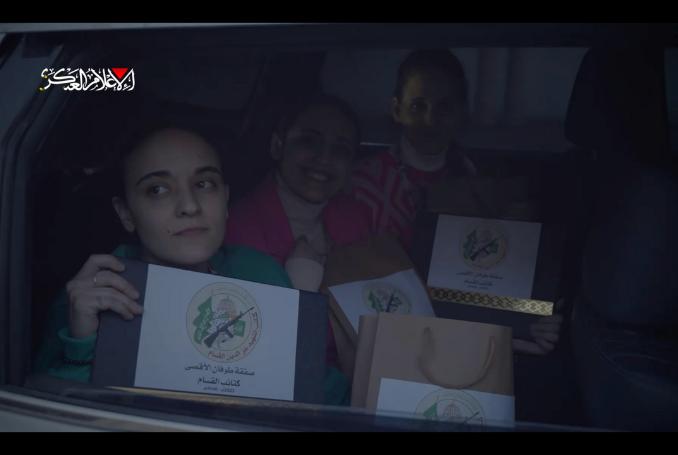
By Jamal Kanj
The international community’s silence on the plight of Palestinian prisoners stands in stark contrast to the overwhelming outpouring of concern for Israeli captives.
The release of three Israeli women held captive in Gaza on Sunday attracted significant global media attention. However, there was comparatively limited coverage of the freed Palestinian women, who had been kidnapped and detained by Israel without charge. This disparity reflects the normalization of the dehumanization of Palestinians, perpetuating a narrative that enables Israel to murder more than 46,000 Palestinians with impunity.
Initial medical assessments by the Red Cross and Israeli doctors indicated that the women were in good health, suggesting they had been treated well during their captivity. Their accounts speak of humane conditions with access to food, water, and shelter. Israel captives were afforded medical care and sustenance when Israel starved Palestinian children, murdered doctors and burned down hospitals.
The Israeli women were treated with dignity during their captivity. In contrast, a United Nations report highlights the mistreatment of Palestinian women in Israeli jails, and how they are “subjected to sexual assault, stripped naked, and searched by male Israeli army officers,” and threatened with sexual violence. The same report also noted that Israeli soldiers took photos of female Palestinian detainees “in degrading circumstances” and threatened to post the images online to further humiliate and exert control over them.
The wellbeing of the released Israeli captives—despite the devastation in Gaza at the hand of Israel¾bespeaks of the humane values of their captors. Without a doubt, their visible appearance reveals that they had enjoyed what the majority of Gazans did not have access to, under the malevolent Israeli siege, such as food, fuel to keep warm, or safe shelter to protect them
from Israeli bombs and the elements.
Meanwhile, a video of the released Khalida Jarrar, a Palestinian woman prisoner leader, shows her struggling to walk—a contrast to the image of her before she was kidnapped by Israeli occupation forces in December 2023.
The care shown to Israeli prisoners is the polar opposite of the treatment Palestinian prisoners received in Israeli custody. Among them, detained Palestinian doctors tortured to death not for carrying a gun, but rather for holding a scalpel in the operating room to treat the injured, possibly including Israeli captives.
Palestinians who survived Israeli torture, like bodybuilder Moazaz Obaiyat, tell a different story. Obaiyat was detained following a pre-dawn raid on his West Bank home in October 2023. Unlike the healthy Israeli women who sprinted into the Red Cross vehicles upon their release, the once strong and muscular Obaiyat was unable to walk unaided after being held without charge for eleven months.
For Palestinians held in Israeli jails, the reality could not be more different since 1948. The maltreatment of Palestinian prisoners, torture, abuse, and even death in custody have been well-documented by human rights organizations. According to UN sources, 56 Palestinians have lost their lives in Israeli prisons due to torture since October 7 2023.
Male Palestinian detainees have also been victims of sexual assault as a means of humiliation and coercion. These crimes are not isolated incidents but part of a racist Israeli policy designed to break their will. Not only have the Israeli perpetrators gone unpunished, but their actions have often been justified or defended by Israeli leaders. For Palestinian prisoners—many held without charge or trial—captivity is an experience of unimaginable torment.
Torture and the humiliation of Palestinians in Israeli jails is backed by Israeli officials, such as Israeli lawmaker Hanoch Milwidsky. When asked if it was acceptable “to insert a stick into a person’s rectum,” Milwidsky responded, “Yes, if he is a Nukhba (Hamas militant) everything is legitimate to do! Everything!”
According to Israeli accounts, this qualification of being a Hamas militant effectively applies to every Palestinian in Gaza, as per Israeli government, “there are no innocent civilians.” This sentiment was echoed earlier by the self-proclaimed moderate Israeli President Isaac Herzog, who declared, “An entire nation out there is responsible.”
In defending the abusive actions by reservist jailers, the racist Israeli National Security Minister Itamar Ben Gvir wrote in a post on social media: “Take your hands off the reservists,” referring to Israeli soldiers charged with sodomizing Palestinian prisoners.
Torture, detention without charge, and other punitive measures remains a persistent feature of Israeli policy discourse. This institutional backing not only perpetuates abuse but also normalizes this behavior in the Israeli culture, against the Palestinian “goyim.”
When abuses are exposed, Israeli officials often deny or downplay them as isolated incidents. They refuse to allow independent investigations or hold anyone accountable. Israeli prison officials and political leaders consistently defend their actions, framing any criticism as an attack on Israel’s security apparatus. Some Israeli lawmakers and public figures argue that the humanization of Palestinian prisoners undermines the morale of security forces.
The disparity in the treatment of prisoners serves as a microcosm of the broader power and ethical divide between Israelis and Palestinians. While Israeli captives are humanized, Palestinians in Israeli jails endure systemic abuse that reflects the dehumanization of an entire people. This double standard is not only a moral failing but also a reflection of the deep-seated Zionist ideology that dismisses the humanity of Palestinians.
The international community’s silence on the plight of Palestinian prisoners stands in stark contrast to the overwhelming outpouring of concern for Israeli captives. This selective outrage only enables the Israeli policies of dehumanization, injustice and oppression. The contrasting reality between Israeli and Palestinian captives exposes not just the dehumanization inherent in the Israeli culture toward non-Jews, but also strips naked the selective morality of the West.

– Jamal Kanj is the author of “Children of Catastrophe,” Journey from a Palestinian Refugee Camp to America, and other books. He writes frequently on Arab world issues for various national and international commentaries. He contributed this article to The Palestine Chronicle